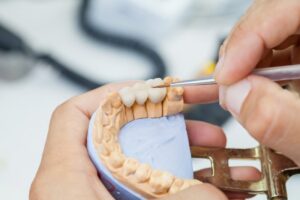
Getting a dental crown is a common procedure used to restore a damaged or decayed tooth, and while it’s typically straightforward, the recovery process can bring up a few questions. If you’ve just received a crown or are preparing for the procedure, knowing what to expect during recovery can help you heal more comfortably and confidently. Here is a look at the healing process.
What is a Dental Crown?
A dental crown is a custom-made cap that fits over a tooth to restore its shape, size, strength, and appearance. Crowns are often used after a root canal, to protect a cracked tooth, or to support a tooth with a large filling. While the process is routine, the recovery experience varies depending on the type of crown, the condition of the tooth, and individual sensitivity.
What to Expect After the Procedure
Recovery from a dental crown typically takes just a few days, although it can take up to two weeks for your mouth to fully adjust. Here’s what you might experience:
- Sensitivity and discomfort: It’s common to feel some sensitivity to hot or cold foods and drinks, particularly if the tooth still has a live nerve. Mild soreness around the gums or jaw is also normal. Over-the-counter pain relievers like ibuprofen or acetaminophen usually manage this discomfort effectively.
- Temporary crown care: If a temporary crown is placed before the permanent one is ready, it’s important to be cautious. Temporary crowns are more fragile, so avoid sticky or hard foods and chew on the opposite side of your mouth.
- Adjusting to the crown: The crown may feel a bit unfamiliar at first. You might notice a difference in your bite or the way your teeth come together. If your bite feels uneven after a few days, contact your dentist for an adjustment.
Tips for a Smooth Recovery
- Maintain Good Oral Hygiene: Brush gently around the crown area and floss carefully to avoid irritating the gum tissue. Avoid using floss that might snag the crown. Your dentist can recommend the best technique.
- Watch Your Diet: Stick to soft foods for the first day or two. Avoid overly hard, chewy, or sticky foods that could dislodge or damage the crown.
- Manage Pain and Swelling: Use cold compresses on your cheek to reduce any swelling, and take pain medication as directed by your dentist.
- Avoid Grinding: If you grind your teeth at night, ask your dentist about a night guard. Grinding can damage both natural teeth and crowns over time.
When to Call Your Dentist
While mild discomfort is normal, contact your dentist if you experience:
- Severe pain or swelling that doesn’t improve.
- A crown that feels loose or falls out.
- An uneven bite after several days.
- Signs of infection, such as pus or fever.
Recovering from a dental crown procedure is usually quick and uncomplicated. With proper care and attention to your dentist’s instructions, you’ll be back to normal in no time, enjoying a stronger, healthier smile.
About the Author
Dr. Jordan Juarez has practiced dentistry for 10 years. He is a graduate of Pacific University in San Francisco and completed his residency in Seattle. If you are considering dental crowns to restore your smile and functionality, Dr. Jordan and our team can save you the hassle of multiple appointments with same-day crown placement done right in-house! Just visit us online to schedule your appointment or call our Carrollton office at (972) 306-2273.
